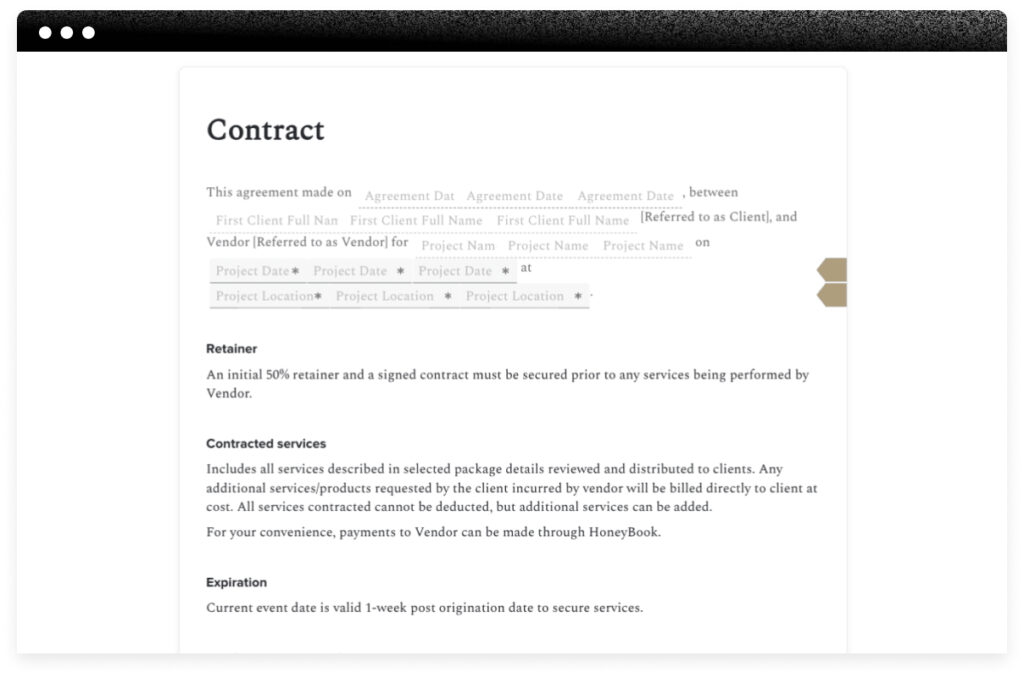Your client relationships need to be carefully outlined in a business contract. Find out how to create a contract template, what you need to include, and the different types of contracts that may apply to your independent business.
As an independent business owner, you need to know exactly when and why you’d need a contract. Contracts are written agreements that outline terms like timelines, payment, scope of work, and rights and responsibilities of the parties. They are legally binding documents that help both parties stay accountable.
Independent contractors use and sign agreements with clients to ensure that the terms of the relationship are agreeable, realistic, and clear. As a service provider, you may even need several types of contracts when running your independent business. Find out which types of contracts you need to know and how to create a contract template so you know you’re legally protected.
Jump to:
- Types of business contracts
- What are the essential elements of business contracts?
- Four steps to follow to create a contract
- Contract FAQs
- Finding the right business contract template
Types of business contracts
Businesses use many different agreements to establish terms and details about work. It’s helpful to know exactly what you may come across when establishing new relationships with clients. These are the most common types of contracts for businesses:
- Independent contractor agreement: These contracts are especially applicable to independents and freelancers. They provide all the details about a relationship with a client, including what work will be provided, over what time period, and how the worker will be paid.
- Nondisclosure agreement (NDA): NDAs prohibit certain parties from disclosing sensitive information about a business, such as confidential customer or proprietary information. One or both parties may be restricted in NDAs, as they can be mutual or one-sided.
- Employment agreement: This is an agreement you would sign if you’re becoming an employee of an organization. The contract would include the offer of employment, duties of the position, compensation and benefits information, termination terms, and specific rights and responsibilities of both the employer and employee.
- Master service agreement (MSA): This is a general contract that many businesses use to outline overall broad terms for a long-term agreement with a client.
- Statement of work (SOW): SOWs are often added to MSAs to provide more specific details, like timelines and pricing about individual projects, that fall under the overall MSA.
- Request for proposal (RFP): You may come across RFPs from clients who are asking for bids for projects. An RFP is a legal document that alerts potential contractors of a new opportunity. Contractors then use the RFP to submit their bids for consideration.
- Lease agreement: Leases are implemented when you’re renting a property or some kind of business equipment. The lease will include details about pricing, timelines, termination terms, and the rights of both parties.
- Non-compete agreement: You may see a separate non-compete agreement or just a non-compete clause in a contract. Non-compete means you agree not to work with or for a competitor of the client for the contract term and a certain period of time after in an effort to protect their sensitive business information. Some regular employees may sign these agreements when they’re hired by a business as well.
- Amendments: Amendments will be needed from time to time to modify the original terms of a contract. You can amend any type of contract as long as the changes are made clear and both parties sign it. Those new terms then supersede the original terms. For example, if you are extending a contract with a client, you may sign an amendment with a new timeline.
The most important thing to remember about business contracts is that they should be thorough and clear. The relationship and terms need to be carefully worded to avoid any unforeseen legal challenges.
What are the essential elements of business contracts?
A legal contract doesn’t look just one way. How it’s drafted and what’s included will depend on factors like your industry, the work you provide, and your unique needs and goals.
However, certain elements should be included in every contract, including:
- The date
- The names and addresses of all parties
- A description of the work
- The timeline of the work
- Payment terms
- Contact information
- Termination terms
- Governing law binding the agreement (your state)
- The arbitration process to follow if terms are violated
- A force majeure clause to account for unforeseen, unavoidable events
In addition, independent businesses should consider a few other clauses in their contracts.
For example, a confidentiality clause, which is similar to an NDA, ensures that the parties don’t disclose sensitive information accessed during the business relationship. An indemnification clause is designed to provide extra protection, and it states that the indemnifying party won’t be held liable for any damages of the other party. Independent businesses should also include a termination clause that states the conditions under breach of contract and all the cases in which a project would be terminated.
Four steps to follow to create a contract
You don’t have to be a legal expert to begin the contract process. Independent businesses technically don’t need a formal contract, as any type of agreement in writing, like an email, could potentially hold up in court.
However, it’s always a good idea to further protect your business with a professional, robust contract agreement. Here are a few steps to take to create a contract:
1. Start with a contract template and contract essentials
Many websites provide online contracts to browse, personalize, and save. Just be sure that the contract template you use includes all of the necessary terms and is agreeable, realistic, and beneficial to your business.
HoneyBook provides many free contract templates for businesses to choose from so you always know you’re protected.
2. Include clauses specific to your business
Your industry and line of work may have its own set of clauses you need to add. For example, if you run an independent writing business, you may want to include a more detailed clause about intellectual property ownership, which outlines whether you or your client own the content you create.
3. Include information specific to your client
You may start with a contract template, but each agreement needs to include specific details about each client relationship. This includes items such as the timeline, milestones, deadlines, payment terms, pricing, and the scope of the work.
4. Have an attorney review your contract
No matter how thorough you are when creating your contract, it’s always possible that you may miss an important component. When you’re done drafting your contract template, send it to an attorney for final review and sign-off. Another good practice is having an attorney read a contract when the client has requested a lot of changes you’re not sure about. Be thorough and practice due diligence.
Contract FAQs
Navigating the world of contract creation isn’t always easy when you run an independent business. Here are a few additional frequently asked questions to help you understand the basics of creating contracts:
What’s the difference between a contract and an agreement?
The terms “contract” and “agreement” are often used interchangeably. They usually refer to the same thing—a legally binding document that outlines terms and is signed by all applicable parties.
However, sometimes an agreement could refer to a more informal agreement, like a verbal or informally written agreement. These agreements can still be legally binding. However, formal legal documents are often referred to as agreements as well, so be sure you ask for clarification if a client is using one or both of these terms.
When does a business contract need to be in writing?
It’s always a good practice to get any type of agreement in writing. If anything happens, a written agreement is proof and can hold up in court. Oral agreements can technically be legally binding, but they are very difficult to prove in court.
However, there are a few cases when contract in writing is required, including:
- The sale of a property, goods, or services with a value over $500
- Agreements that last a long time, typically considered to be anything over one year
- A contract that involves taking on debt or liability
- Contracts related to an estate.
Are verbal agreements legally binding?
Verbal agreements take place when you agree to something through oral communication, but it’s not recorded. These are technically legally binding agreements, but they’re much harder to prove in court. This is why it’s always wise to get a written agreement that’s signed by all parties, either in person or via electronic signature.
When would I need a business contract template?
You may want to have a template of your general business terms that you can use with each client. This ensures you are always covered, and you can edit the specific details each time, like dates, payment information, work provided, and contact information. Using a template can also help you speed up the contract process for your business.
Finding the right business contract template
Knowing which contracts your business needs is the first step toward greater protection, but crafting them doesn’t have to be time-consuming or costly. The HoneyBook Template Gallery is designed to simplify contract creation, offering a curated selection of legally sound, customizable contract templates. These templates cover various business needs so you can confidently protect your interests without starting from scratch.
Whether you’re finalizing a client agreement or setting terms for a new project, HoneyBook templates allow you to get started quickly, with room for easy adjustments. Explore the gallery to find the ideal templates that support your business growth and deliver a streamlined, professional experience for you and your clients.
Disclaimer: The advice featured in this guide and on the blog is for sharing general information and knowledge. For specific legal advice, please consult an authorized professional.







